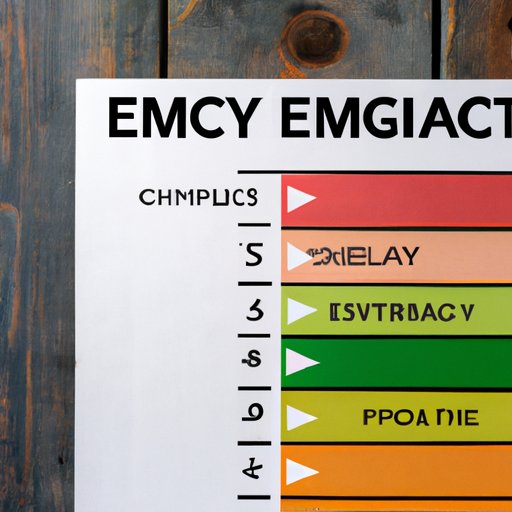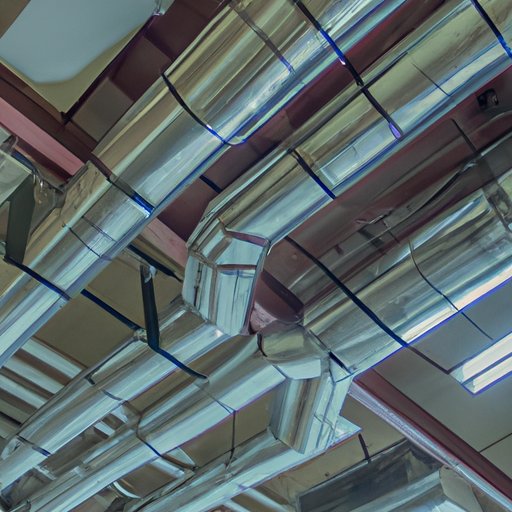Introduction
An HVAC system is an essential part of many homes and buildings, providing heating, cooling, and ventilation to maintain indoor comfort and air quality. Understanding the basics of HVAC systems can help ensure that your system is working properly and efficiently. This article provides a comprehensive guide to HVAC systems, including what they are, how they work, and how to choose the right system for your home or business.
An Overview of HVAC Systems: What You Need to Know
HVAC stands for heating, ventilation, and air conditioning. An HVAC system is a built-in system that regulates air flow and maintains consistent temperature and humidity levels inside a building. There are three main types of HVAC systems: central, split, and ductless. Central HVAC systems use a centralized unit to provide heating and cooling to an entire building, while split systems use separate indoor and outdoor units. Ductless systems, as their name implies, don’t require ductwork to distribute air throughout a building. Each type of system has its own advantages and disadvantages, depending on your needs and preferences.
The Importance of HVAC Systems and How They Work
HVAC systems are crucial for maintaining indoor comfort and air quality. They work by extracting air from inside a building, passing it through a heat exchanger or cooling coil, and then distributing the heated or cooled air through a series of ducts or pipes. The HVAC system can also remove excess moisture from the air and filter out dust, pollutants, and allergens. Some common problems that can occur with HVAC systems include leaks, clogs, and electrical or mechanical failures.
Heating, Ventilation, and Air Conditioning: A Guide to HVAC Systems
HVAC systems are comprised of several components that work together to provide various functions. The three main functions of an HVAC system are heating, ventilation, and air conditioning. Heating systems use a furnace or boiler to produce heat, while ventilation systems circulate air throughout a building to maintain air quality. Air conditioning systems use a refrigerant to cool the air and remove excess moisture. Some common components of HVAC systems include the furnace, air ducts, air filters, evaporator coil, blower fan, compressor, and refrigerant lines.
Breaking Down the Components of an HVAC System
Each component of an HVAC system plays a vital role in maintaining indoor comfort and air quality. The furnace or boiler generates heat by burning fuel or electricity, while the air ducts distribute the heat throughout the building. The air filter removes dust and other pollutants from the air, while the evaporator coil and blower fan work together to circulate cool air during the summer. The compressor and refrigerant lines are responsible for cooling the air and removing excess moisture. A well-designed and properly functioning HVAC system can keep your home or business comfortable year-round.

Maximizing Energy Efficiency with Your HVAC System
Energy efficiency is an important consideration when it comes to HVAC systems, as they can account for a significant portion of a building’s energy consumption. There are several steps you can take to improve the energy efficiency of your HVAC system, including upgrading to a more efficient unit, using a programmable thermostat, and sealing air leaks and ductwork. Some energy efficiency ratings and certifications to look for when choosing an HVAC system include SEER (seasonal energy efficiency ratio), ENERGY STAR, and NATE (North American Technician Excellence).
The Benefits of Regular HVAC Maintenance and Upgrades
Regular maintenance is essential for keeping your HVAC system running smoothly and efficiently. This includes tasks such as cleaning or replacing air filters, checking refrigerant levels, and inspecting ductwork for leaks. Upgrading to a newer, more efficient system can also provide several benefits, including lower energy bills, improved indoor air quality, and increased comfort levels. Investing in regular maintenance and upgrades can save you money in the long run and ensure that your HVAC system lasts for many years.
How to Choose the Right HVAC System for Your Home or Business
Choosing the right HVAC system requires careful consideration of several factors, including the size and layout of your space, your budget, and your energy efficiency goals. It’s important to consult with a professional HVAC contractor before making a decision, as they can provide valuable guidance and recommendations based on your specific needs. When choosing an HVAC contractor, look for one who is licensed, insured, and has a good reputation in the industry.
Conclusion
HVAC systems play a crucial role in maintaining indoor comfort and air quality. By understanding the basics of HVAC systems, you can make informed decisions when it comes to choosing and maintaining your system. Whether you’re a homeowner or a business owner, investing in a well-designed and properly functioning HVAC system can provide numerous benefits, including improved comfort, energy savings, and better air quality. For more information on HVAC systems, consult with a professional contractor or visit industry associations and government websites.
